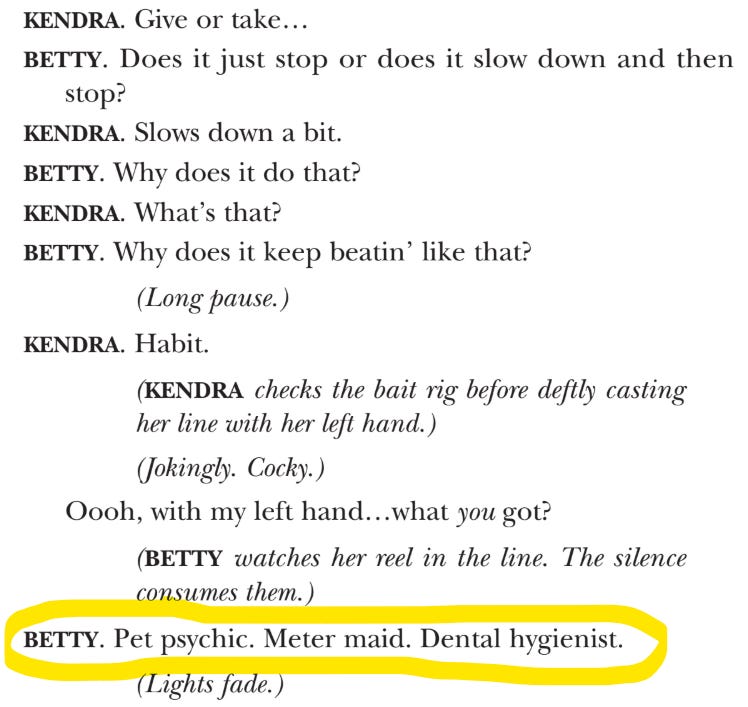How to Layer Grief Without Sentimentality
a note for playwrights who hate cheap tears
I don’t trust plays that beg you to cry. I don’t trust characters who “grieve” in tidy monologues about how much they miss someone. I don’t trust weepy music or lighting cues that whisper, now feel this. But reader: I used to.
What I know now is… grief isn’t theatrical. It’s grotesque. Boring. Erratic. It’s someone eating crackers in bed for three weeks. It’s not crying at the funeral but absolutely losing your shit over a can of baked beans. It’s silence. Or laughter. Or a slap.
So if you’re writing grief, here’s the trick: Don’t write grief. Write the shape of what’s missing.
1. Let the Joke Carry It
Grief leaks out in weird places. A character cracks a joke at the worst possible moment, not to deflect, but because the punchline is the only pressure valve left. If you’ve written a gut-wrenching moment, try undercutting it. Give someone a line that makes the audience laugh and ache at the same time. That’s where it lives. Here’s a heated exchange from my play Alabaster:
The line gets a huge laugh nearly every night, but June is deadly serious. She wants Alice to know she does not—not for one second—trust her and she makes it crystal clear without “naming it.” It’s not disrespect. It’s survival.
2. Use the Body
Grief is physical. It moves like molasses. Or lightning. Someone can’t sit still. Someone can’t get up. Someone keeps picking lint off their pants. Or maybe they stare at the same stain on the wall for 7 pages. Write what the grief does to their limbs. Let the body carry what the mouth can’t.
That stage direction is from the opening scene of my play Maytag Virgin, and in that single wordless moment, we learn more about Lizzy than perhaps the entirety of the play. No dialogue needed. It’s a whole elegy.
3. Let Silence Be the Line
A pause isn’t nothing. A beat isn’t “waiting for the next thing.” If you’re writing grief, silence is the thing. The silence is the character. Track it. Use it. Build it into the rhythm of your play like it’s dialogue, as in this moment from my play Fin and Euba:
That’s your climax. That’s your full-body scream.
4. “Light It” Wrong
If the grief’s on stage, don’t point at it. Don’t bathe the moment in blue. Let it stay in the corner. Let it happen half-lit. Or too bright. Let the stage picture resist the temptation to match the emotion. Mismatch = tension. Grief doesn’t want to be looked at directly. It wants to sit behind the fridge and rot. Let it.
In the above example from my play The Gulf, the water is still. No thunderclap to mark the heartbreak. Betty quietly asks:
"Why does it keep beatin’ like that?"
(Long pause.)
KENDRA. Habit.
The scene could end there, but it doesn’t. No spotlight on the “obvious” line—Habit. No music swells. No shadows lengthen. The answer just lands. Flat. Ordinary. Brutal.
And then, the unexpected—
"Pet psychic. Meter maid. Dental hygienist."
Betty tosses out her little list of possible lives for Kendra (as she’s done all night, but this time, the job titles are sad, silly, small), like she’s joking. But she’s not. She’s grieving. The list confirms the cycle they’re stuck in, the quiet doom of repetition, or something I like to call “reckless apathy.” The lighting doesn’t shift. Nothing marks the gravity—just a slight lift at the end of the scene… like a shrug. Let the moment ache without emphasis. No framing.
5. Trust the Mess
Not all loss is tragic. Some grief is laced with guilt. Or fury. Or full-on relief. Write that. Let the character say the awful thing. Let them admit they’re glad he’s dead. Or that they forgot her birthday. Or that they just don’t feel it yet. Here’s a moment from my play The Garment:
Say the awful thing. See where it takes you. You can always dial it back later.
PAID SUBSCRIBERS GET A FREE MONTHLY STICKER!
YES, I POST SUBMISSION OPPS
https://audreycefaly.substack.com/t/submissions (bookmark this page)
PREVIOUS ARTICLES BY AUDREY CEFALY
LEAN MORE ABOUT AUDREY
Visit my website for more about me and the work I do!
QUICK LINKS TO MY PLAYS
Audrey Cefaly's plays (Alabaster, Maytag Virgin, The Gulf, The Last Wide Open, Trouble) have garnered the Lammy Award, the Calicchio Prize, the NNPN Goldman Prize, the Edgerton, and a Pulitzer nomination. Her works have been produced at Signature Theatre, Cincinnati Playhouse, Barter Theatre, Merrimack Rep, Florida Studio, Florida Rep, Gulfshore Playhouse, and countless others. Cefaly is a Dramatist Guild Foundation "Traveling Master," an Arena Stage playwright cohort, and a recipient of the Walter E. Dakin Fellowship from the Sewanee Writers Conference. She is published by Concord Theatricals, Applause Books, Smith & Kraus and TRW.



















Another great post! So useful. I look forward to putting these strategies to work!
Excellent post! Thank you. Jenny Schwartz’s play “God’s Ear,” is also a great example of how to write grief without sentimentality.